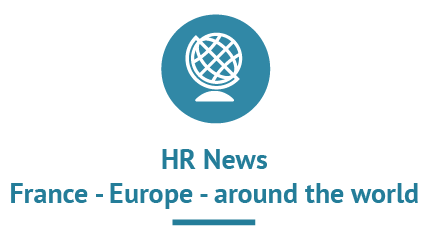|
If you are having trouble viewing this email, open it with your internet browser,
download the PDF version
or contact us.
|
 |
| #40 - December 2021 |
| PDF version - Manage your subscription - Search - Archives |

|
|
vision RH is a newsletter published by the French Directorate General for Administration and the Civil Service (DGAFP). It draws on information sources and reports issued by public administrations, the private sector, international organisations and the press, in several different languages. It aims to provide a broad view of current human resources and civil service initiatives.
|
|

|

|
| The many uses of artificial intelligence for human resources must be regulated | |||||
|
As the areas in which artificial intelligence (AI) is being used are becoming more varied and numerous, it is already being applied to HR as well as to the public sector. The latter is a major employer and has been won over by the many opportunities for procedure automation and analytical information processing. With Germany at the helm, the OECD rolled out a programme to measure and analyse the impact of AI on work, innovation, productivity and skills in 2020 (1). The aim is to help governments manage the transition by ensuring responsible and human-centred use to improve individual and societal well-being. In Belgium, the federal services are conducting a survey of their staff to assess the extent to which AI is being used and to identify the remaining questions or reluctances. Drawing on the results, strategic recommendations will be made in the near future. In Austria, job seeking can now be optimised. The civil service job exchange now has a CV parsing functionality to make these searches easier and personalised. Uploaded CVs are analysed by a system that codifies and structures the information so as to show offers that match these criteria. This means that the selection is more finely-tuned and more accurate. The first “virtual job interviewer” has been introduced in a Swedish municipality as a direct result of the COVID-19 pandemic. In Upplands-Bro, the main feature of the Tengai robot, which was developed by Stockholm's KTH Royal Institute of Technology and a startup, is conducting interviews using data that allegedly mitigates unconscious bias by removing the human influence. It is highly likely that civil service HR information systems will make use of this technology and South Korea is already a trailblazer in this respect. E-Saram is so much more than a management application as it helps with HR policy implementation by using a number of decision-making assistance modules. HR advisers carry out simulations (defining priority skillsets for positions subject to hiring difficulties, modelling career paths to help guide and select applicants or arranging for knowledge transfers by identifying possible partners). Use of AI technologies will need to be rapidly incorporated into training given to civil servants and falls outside the confines of digital skills as it has a strong ethical content. In the United States, federal employees will receive AI certification after taking a special course and undertaking to strictly comply with a code of ethics. A large number of projects – some of which may be controversial – are already being initiated. For instance, in Spain, the autonomous region of Andalusia is looking to introduce a “civil servant genome”. Its designers explain that this would involve collecting comments posted on social media to “better understand interests and provide access to positions to which it can adapt”. The project is facing opposition from professional bodies. Taking advantage of the many opportunities offered by AI is therefore a trend that is gradually gathering ground. In the United Kingdom, the regulatory authority responsible for upholding information rights has warned the civil service about the risks, or even abuses, which could be caused by the mainstreaming of intensive automation. Algorithms result from human programming and, as such, do not guarantee either equal treatment or non-discrimination.
|
|||||
|
|||||
|
|
|||||

|
|||||

|

|

|
| Germany: new objectives for the new coalition | |||||
|
The new German government has set out its priorities in the coalition agreement. Supervisors will have to promote a modern managerial and administrative culture, and propose digital solutions. Employee initiatives and commitment should be both recognised and rewarded. The main measures are the abolition of the temporal limitation of budget-funded contracts and the promotion of external mobility. |
|||||
|
|||||
|
|
|||||

|
|||||
| OECD: Public Integrity Indicators Portal | |||||
|
On International Anti-Corruption Day, the international organisation unveiled its Public Integrity Indicators Portal which is based on primary data sources that have been validated by participating countries. It puts forward six sets of indicators, one of which covers the existence of enforcement mechanisms, fairness and openness, and the effectiveness of supervisory and appeal instruments in human resource management systems. |
|||||
|
|||||
|
|
|||||

|
|||||
| Belgium: the federal laboratory wins a European prize | |||||
|
#GovBuysInnovation is a platform that helps identify and implement innovative solutions for the Belgian federal public services through their innovation lab, Nido. The strategy involves working in phases and taking time to experiment (principle of iteration). It has just been awarded a prize in the “Innovative” category by the EIPA in Maastricht. « In the years to come, we will continue to invest to better unleash the innovation potential of our thousands of public servants »
|
|||||
|
|||||
|
|
|||||

|
|||||

|

|
| France: further increasing the appeal of apprenticeship | |||||
|
Over the last four years, the number of apprentices in the French civil service has almost doubled. New measures will be introduced in early 2022 to keep up this momentum. An annual €500 bonus will be allocated to apprenticeship managers and it will become easier to access established employment status – initially – by tailoring the oral tests of competitive examinations to better factor in the experience acquired. |
|||||
|
|||||
|
|
|||||

|
|||||
| United Kingdom: online induction for new staff | |||||
|
After having been introduced during the COVID-19 pandemic, the online induction course has been a resounding success with the interested parties and is set to be mainstreamed. The course was drawn up by the British Government Campus’s training unit using the FutureLearn digital platform and has benefitted from including individual and team stories. It provides new staff with informal knowledge to help them adapt to their new working environment. |
|||||
|
|||||
|
|
|||||

|
|||||
| Spain: a skills framework for transformation | |||||
|
Digital skills are being organised as they have become prerequisites for implementation of many transformation projects. The Spanish government has unveiled its framework which covers six areas: appropriation and information, communication and collaboration, content creation, security, problem solving and innovation. Each area has three levels (basic, intermediate and advanced). « Transformation is not just about knowing how to use the tools, it is about developing skills and promoting change »
|
|||||
|
|||||
|
|
|||||

|
|||||

|

|
| Norway: an appraisal interview for leaving staff | |||||
|
Having an interview with a civil servant who has chosen to leave their position in order to know all the reasons is still fairly uncommon. The Norwegian Agency for Public and Financial Management (DFØ) is looking to raise awareness of this issue and is providing a script for managers – and HR departments – to conduct these ones and then to analyse and document the results. It aims to better identify expectations and avoid mistakes when hiring. |
|||||
|
|||||
|
|
|||||

|
|||||
| Portugal: framework for European discussions on leadership | |||||
|
After having been introduced during the Portuguese Presidency of the Council of the European Union during the first half of 2021, a pilot programme to enable intermediate public sector executives to take part in leadership development discussions has now taken shape. Immersion sessions foster the exchange of information, experience and best practices. Five countries (Belgium, Spain, France, Portugal and Slovenia) and the European Union are active participants |
|||||
|
|||||
|
|
|||||

|
|||||
| France: a platform for the digital professions | |||||
|
Finding and attracting specific profiles such as application designer or data analyst is a major challenge for French government departments to which these experts do not spontaneously apply. A new website has just been launched to present the government’s digital assignments and projects, and the related job offers. There are testimonies describing the different professions and sectors of activity. « Boost the notoriety of opportunities and be identified as one of the leading digital employers for a successful transformation »
|
|||||
|
|||||
|
|
|||||

|
|||||

|

|
| Canada: implementation of the Pay Equity Act | |||||
|
As part of the Canadian Pay Equity Act, which came into force in August 2021, a three-year implementation process has begun. The Public Service will have to set up ad hoc committees and draft action plans for dissemination. Any gaps between compensation of jobs held mostly by women and those held mostly by men should be closed in the long term by pay rises for work of equal value. |
|||||
|
|||||
|
|
|||||

|
|||||
| Italy: guidelines for agile working in government | |||||
|
Unions and the Italian government have agreed on guidelines governing new work arrangements in normal circumstances. They set out basic provisions concerning the right to disconnect, the right to take a specific training course, the right to protection of personal data, freedom of association, arrangements for authorisations and absences, and work/life balance. |
|||||
|
|||||
|
|
|||||

|
|||||
| United States: a Quality of Working Life (QoWL) toolkit for managers | |||||
|
Work-Life is a toolkit to help US federal managers build engaged teams. Drawing on Work-Life surveys, it provides primary support for health and well-being in the workplace, programmes to help people encountering difficulties, access to flexible work options and measures for caregivers. The arrangements are completed by a network of QoWL coordinators. « Do everything possible to create a work environment that is both favorable and flexible, which is commensurate with the commitment of staff »
|
|||||
|
|||||
|
|
|||||

|
|||||

|

|
| “Intrapreneuriat” is an indicator of the innovation policy in place at la Française des jeux | |||||
|
Giving momentum to work groups and corporate performance is highly contingent on the ability of firms to innovate. This approach comes up with fresh ideas which engage and involve employees. As France’s leading gambling company, the FDJ group has elected to make this one of the core objectives of its development strategy. The transformation team, which is responsible for the employee experience, has embarked on a cross-cutting strategy open to all. Three major resources have been rolled out for this purpose: • An in-house “client” studio brings to light irritants (things that are not always appreciated or which may disrupt career paths). The goal is to aim for permanent optimisation. • The Lab’ inno puts participants in touch with startups (as part of a number of partnerships: Paris&Co (1), Techstars) to provide a response to shared issues • A collaborative project fast-tracking space helps managers solve complicated strategic and organisational problems Four prerequisites for success have been identified: small teams, methodological support, precise definition of goals, steps and available resources and supervision by an external mentorship programme for meeting inspirational individuals.
|
|||||
|
|||||
|
|
|||||

|
|||||

|

|
| New steps towards ensuring job appeal and well-being for European Union staff | |||||
|
In January 2022, France is set to assume the Presidency of the Council of the European Union for the thirteenth time. At present, EU institutions employ around 42,000 people (1) most of whom are governed by Staff Regulations, but there are also contract staff (23 %). Although it draws strongly on the French model (career-based), the European Civil Service has undergone a number of reforms. The most-recent, dating back to 2014, was recently assessed by the Court of Auditors which concluded that – despite the budgetary savings made – the impact on HR management has been mixed. The Commission has drawn up a new five-year Strategic Plan that sets out how it intends to attract, retain and contribute to the development of staff, and how it will strive to create the right conditions for enhancing career progression. The major challenge to be met by the European Personnel Selection Office (EPSO) is to substantially reduce the duration of competitions. This issue was highlighted in a report from the Court of Auditors and a special recruitment procedure will be rolled out to better target candidates with specialist profiles. .
Two units of the Directorate-General for Human Resources and Security (DG HR) are especially implicated in this modernisation project: Talent Management and Fit@Work. They are implementing a number of priority actions which should help achieve the targets that have been set: • A (pilot) search tool called HR Search is scheduled to be introduced in order to quickly identify the best profiles for vacancies. • To foster mobility, the Career Guidance service offering will be bolstered. A special platform was set up in 2020 and career guidance officers (CGOs) will be given further training to enable them to offer personalised support. • For improved understanding of termination of employment, the known reasons will be analysed. • In light of the huge recourse to hybrid work, the fit@home and fit2lead programmes have been launched. They help staff and managers to find their feet in these new organisational approaches. • Combating isolation is also vital and a HR-Tele-Care helpline is available. The buddy programme offers contact with a volunteer colleague (or retired official) with an eye to forging ties and providing long-term follow-up.
|
|||||
|
|||||
|
|
|||||

|
|||||

|
|
Share
|
||||
|
||||
| SUBSCRIBE - UPDATE YOUR SUBSCRIPTION - ARCHIVES - RSS - UNSUBSCRIBE |
|
French Directorate-General for Administration and the Civil Service (DGAFP)
Publication Manager: Nathalie COLIN Managing Editor: Nicolas de SAUSSURE Editor-in-chief and Autor: Jean-François ADRIAN Layout and graphic design: Jean-François ADRIAN and Aphania. The texts of the publication do not reflect the point of view of the DGAFP
In accordance to the French Act n°78-17 of 6 January 1978 on information technology, data files and civil liberties and to the european General Data Protection Regulation (GDPR), your personal data is stored securely and you are entitled to access, correct and delete them. To do so, you should send an e-mail to (contact-visionrh@kiosque.bercy.gouv.fr) or write to DGAFP: 139, rue de Bercy - 75012 Paris; France.
The links to a machine translation are accessible with the only Chrome browser Reproduction is authorized with mention of the source © DGAFP 2021 / N° ISSN: 2606-7528. |
|
|






